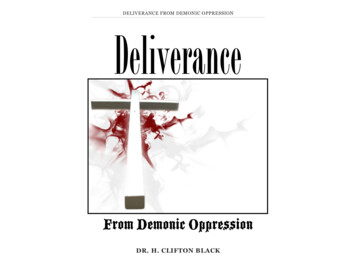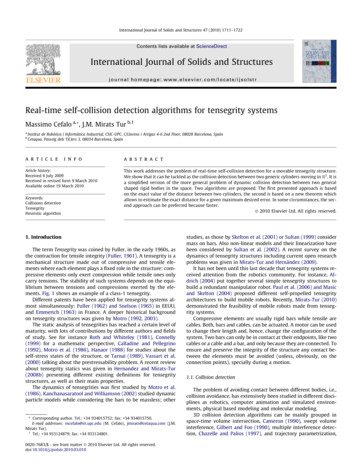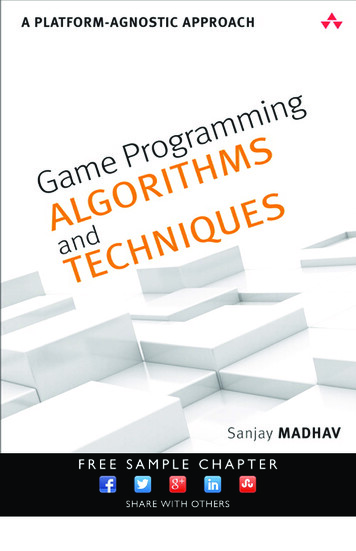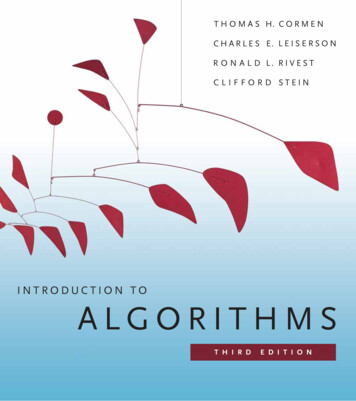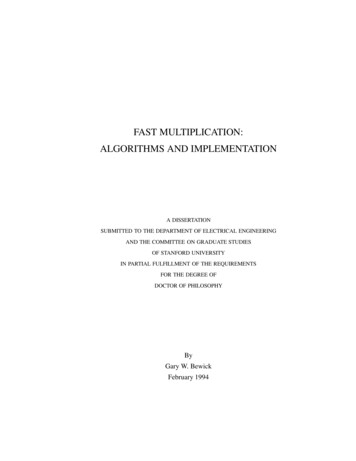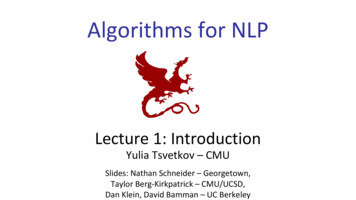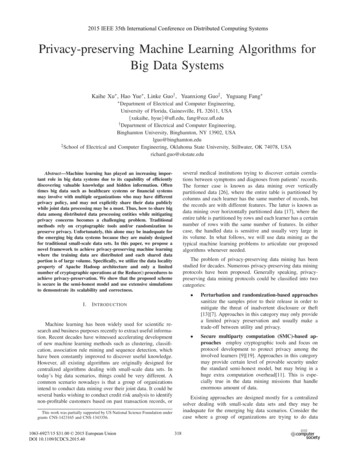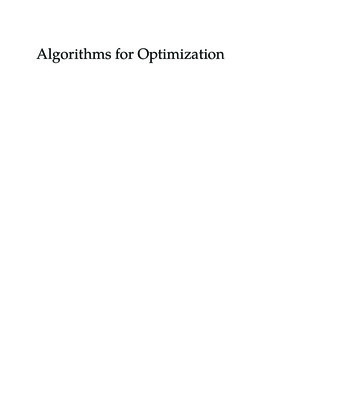
Transcription
Algorithms of OppressionHow Search Engines Reinforce RacismSafiya Umoja Noble111NEW YORK UNIVERSITY PRESSNew York
Introduction The Power of AlgorithmsThis book is about the power of algorithms in the age of neoliberalismand the ways those digital decisions reinforce oppressive social relationships and enact new modes of racial profiling, which I have termedtechnological redlining. By making visible the ways that capital, race, andgender are factors in creating unequal conditions, I am bringing lightto various forms of technological redlining that are on the rise. Thenear-ubiquitous use of algorithmically driven software, both visible andinvisible to everyday people, demands a closer inspection of what valuesare prioritized in such automated decision-making systems. Typically,the practice of redlining has been most often used in real estate andbanking circles, creating and deepening inequalities by race, such that,for example, people of color are more likely to pay higher interest ratesor premiums just because they are Black or Latino, especially if they livein low-income neighborhoods. On the Internet and in our everyday usesof technology, discrimination is also embedded in computer code and,increasingly, in artificial intelligence technologies that we are reliant on,by choice or not. I believe that artificial intelligence will become a majorhuman rights issue in the twenty-first century. We are only beginning tounderstand the long-term consequences of these decision-making toolsin both masking and deepening social inequality. This book is just thestart of trying to make these consequences visible. There will be manymore, by myself and others, who will try to make sense of the consequences of automated decision making through algorithms in society.Part of the challenge of understanding algorithmic oppression is tounderstand that mathematical formulations to drive automated decisions are made by human beings. While we often think of terms such as"big data" and "algorithms" as being benign, neutral, or objective, theyare anything but. The people who make these decisions hold all types of
2INTRODUCTIONINT ROD UCTI ONvalues, many of which openly promote racism, sexism, and false notionsof meritocracy, which is well documented in studies of Silicon Valleyand other tech corridors.For example, in the midst of a federal investigation of Google's allegedpersistent wage gap, where women are systematically paid less than menin the company's workforce, an "antidiversity" manifesto authored byJames Damore went viral in August 2017, 1 supported by many Googleemployees, arguing that women are psychologically inferior and incapable of being as good at software engineering as men, among otherpatently false and sexist assertions. As this book was moving into press,many Google executives and employees were actively rebuking the assertions of this engineer, who reportedly works on Google search infrastructure. Legal cases have been filed, boycotts of Google from thepolitical far right in the United States have been invoked, and calls forgreater expressed commitments to gender and racial equity at Googleand in Silicon Valley writ large are under way. What this antidiversityscreed has underscored for me as I write this book is that some of thevery people who are developing search algorithms and architecture arewilling to promote sexist and racist attitudes openly at work and beyond,while we are supposed to believe that these same employees are developing "neutral" or "objective" decision-making tools. Human beings aredeveloping the digital platforms we use, and as I present evidence of therecklessness and lack of regard that is often shown to women and peopleof color in some of the output of these systems, it will become increasingly difficult for technology companies to separate their systematic andinequitable employment practices, and the far-right ideological bents ofsome of their employees, from the products they make for the public.My goal in this book is to further an exploration into some of thesedigital sense-making processes and how they have come to be so fundamental to the classification and organization of information and atwhat cost. As a result, this book is largely concerned with examining thecommercial co-optation of Black identities, experiences, and communities in the largest and most powerful technology companies to date,namely, Google. I closely read a few distinct cases of algorithmic oppression for the depth of their social meaning to raise a public discussion of the broader implications of how privately managed, black-boxedinformation-sorting tools have become essential to many data-drivenI3decisions. I want us to have broader public conversations about the implications of the artificial intelligentsia for people who are already systematically marginalized and oppressed. I will also provide evidence andargue, ultimately, that large technology monopolies such as Go ogle needto be broken up and regulated, because their consolidated power andcultural influence make competition largely impossible. This monopolyin the information sector is a threat to democracy, as is currently coming to the fore as we make sense of information flows through digitalmedia such as Google and Facebook in the wake of the 2016 UnitedStates presidential election.I situate my work against the backdrop of a twelve-year professionalcareer in multicultural marketing and advertising, where I was investedin building corporate brands and selling products to African Americansand Latinos (before I became a university professor). Back then, I believed, like many urban marketing professionals, that companies mustpay attention to the needs of people of color and demonstrate respectfor consumers by offering services to communities of color, just as isdone for most everyone else. After all, to be responsive and responsibleto marginalized consumers was to create more market opportunity. Ispent an equal amount of time doing risk management and public relations to insulate companies from any adverse risk to sales that theymight experience from inadvertent or deliberate snubs to consumers ofcolor who might perceive a brand as racist or insensitive. Protecting myformer clients from enacting racial and gender insensitivity and helpingthem bolster their brands by creating deep emotional and psychological attachments to their products among communities of color was myprofessional concern for many years, which made an experience I hadin fall 2010 deeply impactful. In just a few minutes while searching onthe web, I experienced the perfect storm of insult and injury that I couldnot turn away from. While Googling things on the Internet that mightbe interesting to my stepdaughter and nieces, I was overtaken by theresults. My search on the keywords "black girls" yielded HotBlackPussy.com as the first hit.Hit indeed.Since that time, I have spent innumerable hours teaching and researching all the ways in which it could be that Google could completelyfail when it came to providing reliable or credible information about
4IINTRODUCTIO NI N TRODU CT IO NI5own actions:' 2 Peterson's allegation is consistent with what many peoplefeel about the hostility of the web toward people of color, particularlyin its anti-Blackness, which any perusal ofYouTube comments or othermessage boards will serve up. On one level, the everyday racism andcommentary on the web is an abhorrent thing in itself, which has beendetailed by others; but it is entirely different with the corporate platformvis-a-vis an algorithmically crafted web search that offers up racism andsexism as the first results. This process reflects a corporate logic of eitherwillful neglect or a profit imperative that makes money from racism andsexism. This inquiry is the basis of this book.In the following pages, I discuss how "hot;' "sugary;' or any otherkind of "black pussy" can surface as the primary representation of Blackgirls and women on the first page of a Google search, and I suggest thatsomething other than the best, most credible, or most reliable information output is driving Go ogle. Of course, Go ogle Search is an advertisingcompany, not a reliable information company. At the very least, we mustask when we find these kinds of results, Is this the best information?For whom? We must ask ourselves who the intended audience is for avariety of things we find, and question the legitimacy of being in a "filter3bubble;' when we do not want racism and sexism, yet they still findtheir way to us. The implications of algorithmic decision making of thissort extend to other types of queries in Google and other digital mediaplatforms, and they are the beginning of a much-needed reassessmentof information as a public good. We need a full-on reevaluation of theimplications of our information resources being governed by corporatecontrolled advertising companies. I am adding my voice to a numberof scholars such as Helen Nissenbaum and Lucas Introna, Siva Vaidhyanathan, Alex Halavais, Christian Fuchs, Frank Pasquale, Kate Crawford, Tarleton Gillespie, Sarah T. Roberts, Jaron Lanier, and Elad Segev,to name a few, who are raising critiques of Google and other forms ofcorporate information control (including artificial intelligence) in hopesthat more people will consider alternatives.Over the years, I have concentrated my research on unveiling themany ways that African American people have been contained andconstrained in classification systems, from Google's commercial searchengine to library databases. The development of this concentration wasborn of my research training in library and information science. I think.,. Sugary Black Pussy .com-Black girls in a hardcore action galeriessugaryblackpussy.com/(black pussy and hairy black pussy,black sex, black booty,black ass,black teen pussy,bigblack ass,black porn star,hot black girl) . .Figure I.l . First search result on keywords "black girls;' September 2011.women and people of color yet experience seemingly no repercussionswhatsoever. Two years after this incident, I collected searches again, onlyto find similar results, as documented in figure I.l.In 2012, I wrote an article for Bitch magazine about how women andfeminism are marginalized in search results. By August 2012, Panda (anupdate to Google's search algorithm) had been released, and pornography was no longer the first series of results for "black girls"; but othergirls and women of color, such as Latinas and Asians, were still pornified. By August of that year, the algorithm changed, and porn was suppressed in the case of a search on "black girls:' I often wonder what kindof pressures account for the changing of search results over time. It isimpossible to know when and what influences proprietary algorithmicdesign, other than that human beings are designing them and that theyare not up for public discussion, except as we engage in critique andprotest.This book was born to highlight cases of such algorithmically drivendata failures that are specific to people of color and women and to underscore the structural ways that racism and sexism are fundamentalto what I have coined algorithmic oppression. I am writing in the spiritof other critical women of color, such as Latoya Peterson, cofounder ofthe blog Racialicious, who has opined that racism is the fundamentalapplication program interface (API) of the Internet. Peterson has argued that anti-Blackness is the foundation on which all racism towardother groups is predicated. Racism is a standard protocol for organizing behavior on the web. As she has said, so perfectly, "The idea of an*gger API makes me think of a racism API, which is one of our corearguments all along-oppression operates in the same formats, runs thesame scripts over and over. It is tweaked to be context specific, but it'sall the same source code. And the key to its undoing is recognizing howmany of us are ensnared in these same basic patterns and modifying our.
6INTRODUCTIONof these issues through the lenses of critical information studies and critical race and gender studies. As marketing and advertising have directlyshaped the ways that marginalized people have come to be representedby digital records such as search results or social network activities, Ihave studied why it is that digital media platforms are resoundinglycharacterized as "neutral technologies" in the public domain and often,unfortunately, in academia. Stories of "glitches" found in systems do notsuggest that the organizing logics of the web could be broken but, rather,that these are occasional one-off moments when something goes terriblywrong with near-perfect systems. With the exception of the many scholars whom I reference throughout this work and the journalists, bloggers, and whistleblowers whom I will be remiss in not naming, very fewpeople are taking notice. We need all the voices to come to the fore andimpact public policy on the most unregulated social experiment of ourtimes: the Internet.These data aberrations have come to light in various forms. In 2015,U.S. News and World Report reported that a "glitch" in Google's algorithm led to a number of problems through auto-tagging and facialrecognition software that was apparently intended to help people searchthrough images more successfully. The first problem for Google was thatits photo application had automatically tagged African Americans as"apes" and "animals:' 4 The second major issue reported by the Post wasthat Google Maps searches on the word "N*gger" 5 led to a map of theWhite House during Obama's presidency, a story that went viral on theInternet after the social media personality Deray McKesson tweeted it.These incidents were consistent with the reports of Photoshoppedimages of a monkey's face on the image of First Lady Michelle Obamathat were circulating through Google Images search in 2009. In 2015,you could still find digital traces of the Google autosuggestions that associated Michelle Obama with apes. Protests from the White House ledto Google forcing the image down the image stack, from the first page,so that it was not as visible. 6 In each case, Google's position is that itis not responsible for its algorithm and that problems with the resultswould be quickly resolved. In the Washington Post article about "N*ggerHouse;' the response was consistent with other apologies by the company: '"Some inappropriate results are surfacing in Google Maps thatshould not be, and we apologize for any offense this may have caused;aoonRe ll'll) Gcuil )Figure I.2. Google Images results for the keyword "gorillas;' April 7,.;.-·2016.e.-:-.,-- ·., ;;Figure I.3. Google Maps search on "N*gga House" leads to the White House,April 7, 2016.7
I NT ROD UC TIO N r0dar:ay mcl!;gsson.J '1.1 If you Google Map nnigga house., this iswhat you 'II find. America. . tf lil!ot i'il:f;L-. -··---· I!W ; :.,t QslX9m ichelle obamaSafeSO."JfCh. Mm,t-Arnteo ·.--V:iJi5l I mag""11.Go -I!f.) OGJ!90L."'""""'- '. ""'""'""'""""'nQ '"'"grumsive Search Re \illllcan be o ff.ens:ive, we """""" ""' "'*RGSd""""' -""'I .1.R '"'ed "'"''"'""" ,f!IJEIZ! l!-."11! -"-tl? l l f m"""' {9Figure I.S. Standard Google's "related" searches associates "Michelle Obama" with theterm "ape:'a Google spokesperson told U.S. News in an email late Tuesday. 'Ourteams are working to fix this issue quicklY:" 7h' ***ii.;:::,n·" r:Tlm Wlhi' e House"7.a:***l;;iPllrFl["fWl:t:lSfiWO Ilf 1.977007!1!.3UUti PM l'Sl M2ii ' ilH.!Figure !.4. Tweet by Deray McKesson about Google Maps search and the WhiteHouse, 2015.8These human and machine errors are not without consequence, andthere are several cases that demonstrate how racism and sexism arepart of the architecture and language of technology, an issue that needsattention and remediation. In many ways, these cases that I present arespecific to the lives and experiences of Black women and girls, peoplelargely understudied by scholars, who remain ever precarious, despiteour living in the age of Oprah and Beyonce in Shondaland. The implications of such marginalization are profound. The insights about sexistor racist biases that I convey here are important because informationorganizations, from libraries to schools and universities to governmentalagencies, are increasingly reliant on or being displaced by a variety ofweb-based "tools" as if there are no political, social, or economic consequences of doing so. We need to imagine new possibilities in the area ofinformation access and knowledge generation, particularly as headlinesabout "racist algorithms" continue to surface in the media with limiteddiscussion and analysis beyond the superficial.
10IINTRODUCTIONInevitably, a book written about algorithms or Google in the twentYfirst century is out of date immediately upon printing. Technology ischanging rapidly, as are technology company configurations via mergers, acquisitions, and dissolutions. Scholars working in the fields ofinformation, communication, and technology struggle to write aboutspecific moments in time, in an effort to crystallize a process or a phenomenon that may shift or morph into something else soon thereafter.As a scholar of information and power, I am most interested in communicating a series of processes that have happened, which provideevidence of a constellation of concerns that the public might take upas meaningful and important, particularly as technology impacts socialrelations and creates unintended consequences that deserve greater attention. I have been writing this book for several years, and over time,Google's algorithms have admittedly changed, such that a search for"black girls" does not yield nearly as many pornographic results nowas it did in 2011. Nonetheless, new instances of racism and sexism keepappearing in news and social media, and so I use a variety of these casesto make the point that algorithmic oppression is not just a glitch in thesystem but, rather, is fundamental to the operating system of the web.It has direct impact on users and on our lives beyond using Internetapplications. While I have spent considerable time researching Google,this book tackles a few cases of other algorithmically driven platforms toillustrate how algorithms are serving up deleterious information aboutpeople, creating and normalizing structural and systemic isolation, orpracticing digital redlining, all of which reinforce oppressive social andeconomic relations.While organizing this book, I have wanted to emphasize one mainpoint: there is a missing social and human context in some types ofalgorithmically driven decision making, and this matters for everyone engaging with these types of technologies in everyday life. It is ofparticular concern for marginalized groups, those who are problematically represented in erroneous, stereotypical, or even pornographicways in search engines and who have also struggled for nonstereotypical or nonracist and nonsexist depictions in the media and in libraries.There is a deep body of extant research on the harmful effects of stereotyping of women and people of color in the media, and I encourageINTRODUCTIONI11readers of this book who do not understand why the perpetuation ofracist and sexist images in society is problematic to consider a deeperdive into such scholarship.This book is organized into six chapters. In chapter 1, I explore theimportant theme of corporate control over public information, and Ishow several key Google searches. I look to see what kinds of resultsGoogle's search engine provides about various concepts, and I offer acautionary discussion of the implications of what these results mean inhistorical and social contexts. I also show what Go ogle Images offers onbasic concepts such as "beauty" and various professional identities andwhy we should care.In chapter 2, I discuss how Google Search reinforces stereotypes, illustrated by searches on a variety of identities that include "black girls;'"Latinas;' and '1\.sian girls:' Previously, in my work published in theBlack Scholar, 8 I looked at the postmortem Go ogle autosuggest searchesfollowing the death of Trayvon Martin, an African American teenagerwhose murder ignited the #BlackLivesMatter movement on Twitterand brought attention to the hundreds of African American children,women, and men killed by police or extrajudicial law enforcement. Toadd a fuller discussion to that research, I elucidate the processes involvedin Google's PageRank search protocols, which range from leveragingdigital footprints from people 9 to the way advertising and marketinginterests influence search results to how beneficial this is to the interestsof Google as it profits from racism and sexism, particularly at the heightof a media spectacle.In chapter 3, I examine the importance of noncommercial search engines and information portals, specifically looking at the case of how amass shooter and avowed White supremacist, Dylann Roof, allegedlyused Google Search in the development of his racial attitudes, attitudesthat led to his murder of nine African American AME Church memberswhile they worshiped in their South Carolina church in the summerof 2015. The provision of false information that purports to be credible news, and the devastating consequences that can come from thiskind of algorithmically driven information, is an example of why wecannot afford to outsource and privatize uncurated information on theincreasingly neoliberal, privatized web. I show how important records
12IINTRODUCTIONare to the public and explore the social importance of both remembering and forgetting, as digital media platforms thrive on never or rarelyforgetting. I discuss how information online functions as a type of record, and I argue that much of this information and its harmful effectsshould be regulated or subject to legal protections. Furthermore, at atime when "right to be forgotten" legislation is gaining steam in the European Union, efforts to regulate the ways that technology companieshold a monopoly on public information about individuals and groupsneed further attention in the United States. Chapter 3 is about the futureof information culture, and it underscores the ways that information isnot neutral and how we can reimagine information culture in the service.of eradicating social inequality.Chapter 4 is dedicated to critiquing the field of information studiesand foregrounds how these issues of public information through classification projects on the web, such as commercial search, are old problemsthat we must solve as a scholarly field of researchers and practitioners.I offer a brief survey of how library classification projects undergird theinvention of search engines such as Google and how our field is implicated in the algorithmic process of sorting and classifying information and records. In chapter s, I discuss the future of knowledge in thepublic and reference the work of library and information professionals,in particular, as important to the development and cultivation of equitable classification systems, since these are the precursors to commercialsearch engines. This chapter is essential history for library and information professionals, who are less likely to be trained on the politics ofcataloguing and classification bias in their professional training. Chapter6 explores public policy and why we need regulation in our information environments, particularly as they are increasingly controlled bycorporations.To conclude, I move the discussion beyond Google, to help readersthink about the impact of algorithms on how people are representedin other seemingly benign business transactions. I look at the "colorblind" organizing logic of Yelp and how business owners are revoltingdue to loss of control over how they are represented and the impactof how the public finds them. Here, I share an interview with Kandisfrom New York, 10 whose livelihood has been dramatically affected bypublic-policy changes such as the dismantling of affirmative action onINTRODUCTIONI13college campuses, which have hurt her local Black-hair-care businessin a prestigious college town. Her story brings to light the power thatalgorithms have on her everyday life and leaves us with more to thinkabout in the ecosystem of algorithmic power. The book closes with acall to recognize the importance of how algorithms are shifting socialrelations in many ways-more ways than this book can cover-andshould be regulated with more impactful public policy in the UnitedStates than we currently have. My hope is that this book will directlyimpact the many kinds of algorithmic decisions that can have devastating consequences for people who are already marginalized by institutional racism and sexism, including the 99% who own so littlewealth in the United States that the alarming trend of social inequality is not likely to reverse without our active resistance and intervention. Electoral politics and financial markets are just two of many ofthese institutional wealth-consolidation projects that are heavily influenced by algorithms and artificial intelligence. We need to cause ashift in what we take for granted in our everyday use of digital mediaplatforms.I consider my work a practical project, the goal of which is to eliminate social injustice and change the ways in which people are oppressedwith the aid of allegedly neutral technologies. My intention in lookingat these cases serves two purposes. First, we need interdisciplinary research and scholarship in information studies and library and inform ation science that intersects with gender and women's studies, Black/African American studies, media studies, and communications to better describe and understand how algorithmically driven platforms aresituated in intersectional sociohistorical contexts and embedded withinsocial relations. My hope is that this work will add to the voices of mymany colleagues across several fields who are raising questions aboutthe legitimacy and social consequences of algorithms and artificial intelligence. Second, now, more than ever, we need experts in the socialsciences and digital humanities to engage in dialogue with activistsand organizers, engineers, designers, information technologists, andpublic-policy makers before blunt artificial-intelligence decision makingtrumps nuanced human decision making. This means that we must lookat how the outsourcing of information practices from the public sectorfacilitates privatization of what we previously thought of as the public
14IINTRODUCTIONdomain 11 and how corporate-controlled governments and companiessubvert our ability to intervene in these practices.We have to ask what is lost, who is harmed, and what should be forgotten with the embrace of artificial intelligence in decision making. It isof no collective social benefit to organize information resources on theweb through processes that solidify inequality and marginalization-onthat point I am hopeful many people will agree.1A Society, Searching On October 21, 2013, the United Nations launched a campaign directedby the advertising agency Memac Ogilvy & Mather Dubai using "genuineGoogle searches" to bring attention to the sexist and discriminatory waysin which women are regarded and denied human rights. ChristopherHunt, art director of the campaign, said, "When we came across thesesearches, we were shocked by how negative they were and decided we hadto do something with them:' Kareem Shuhaibar, a copywriter for the campaign, described on the United Nations website what the campaign wasdetermined to show: "The ads are shocking because they show just howfar we still have to go to achieve gender equality. They are a wake up call,and we hope that the message will travel far:' 1 Over the mouths of variouswomen of color were the autosuggestions that reflected the most popularsearches that take place on Google Search. The Google Search autosuggestions featured a range of sexist ideas such as the following: Women cannot: drive, be bishops, be trusted, speak in church Women should not: have rights, vote, work, box Women should: stay at home, be slaves, be in the kitchen, not speak inchurch Women need to: be put in their places, know their place, be controlled, bedisciplinedWhile the campaign employed Google Search results to make a largerpoint about the status of public opinion toward women, it also served, perhaps unwittingly, to underscore the incredibly powerful nature of searchengine results. The campaign suggests that search is a mirror of users'beliefs and that society still holds a variety of sexist ideas about women.What I find troubling is that the campaign also reinforces the idea that itis not the search engine that is the problem but, rather, the users of searchengines who are. It suggests that what is most popular is simply what rises15
quences of automated decision making through algorithms in society. Part of the challenge of understanding algorithmic oppression is to understand that mathematical formulations to drive automated deci sions are made by human beings. While we often think of terms such as "big data" and "algorith
